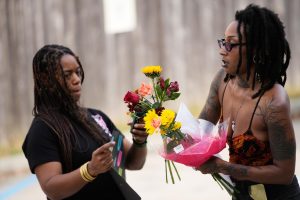Loyola hopes to shelf issue of food insecurity
March 15, 2019
Many Loyola students cannot afford to feed themselves which may be affecting their academic success, an administrative survey reported. The university is now organizing to address the problem of food insecurity, according to Loyola’s chief diversity officer Sybol Anderson.
According to the survey, which Anderson organized, 48 percent of Loyola University students say they experience difficulty affording food.
“When we asked students, faculty and staff to identify priority actions to be undertaken by the community in the current year, all identified addressing student food insecurity as the top priority,” Anderson said.
As soon as the results were presented last April, students in the College of Music Fine Arts set up a food pantry in the music school box office.
After the survey conducted to more precisely assess the nature and scope of food insecurity, Loyola organized a Food Insecurity Committee to begin planning a permanent food pantry.
With push from Heather Malveaux, Minister for Social Justice and Immersion Programs, the Food Insecurity Committee orchestrated the conversion of an abandoned basement office into a fully functioning and superbly stocked pantry in November 2018.
The Food Insecurity Committee also started a meal voucher program allowing students to eat in the cafeteria for free.
“What I’ve been hearing from students is that meals are expensive on campus, you can’t really get a decent meal for less than ten dollars, which is expensive when you’re doing it two times a day,” Malveaux said. “Food insecurity is not just a problem at Loyola, it’s a problem statewide, but also countrywide.”
According to a 2018 report by the Jesuit Social Research Institute, Louisiana has the second highest rate of food insecurity in the nation and it is rising faster than the rest of the country.
Food insecurity refers to the number of people who regularly run out of food, go at least a day without eating, or who do not know where their next meal will come from.
The Food and Agricultural Organization, which is part of the United Nations, explains that food security exists when all people, at all times, have physical and economic access to enough safe and nutritious food that meets their dietary needs and food preferences for an active and healthy life.
Professor Angel Parham, P.h.D., teaches food justice courses at Loyola and has a vested interest in food equity as the founder and CEO of a nonprofit called Nyansa that serves Black low-income New Orleanians.
“Food insecurity is related to several factors including poverty, low productivity and poor physical and cognitive development,” Parham said.
Anderson agrees, “It impedes one’s ability to optimize one’s capacities for learning and retaining information.”
She described the four dimensions of food security as availability, access, utilization and stability.
“When any of these is threatened, a person or population is food insecure,” Parham said.
Parham thinks Loyola’s new programs are a step in the right direction.
“It is so important to make this part of our conversation as a community so that people who are struggling with food access and affordability do not feel isolated. When we know that many are struggling, this gives all of us permission to talk about the problem and to take decisive steps toward addressing it,” she said.





